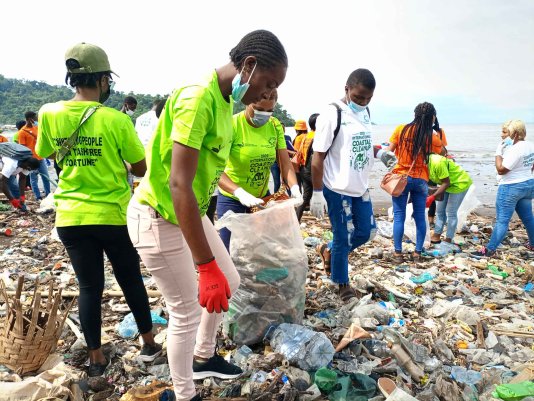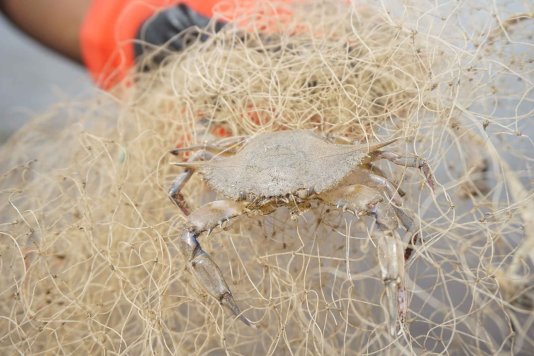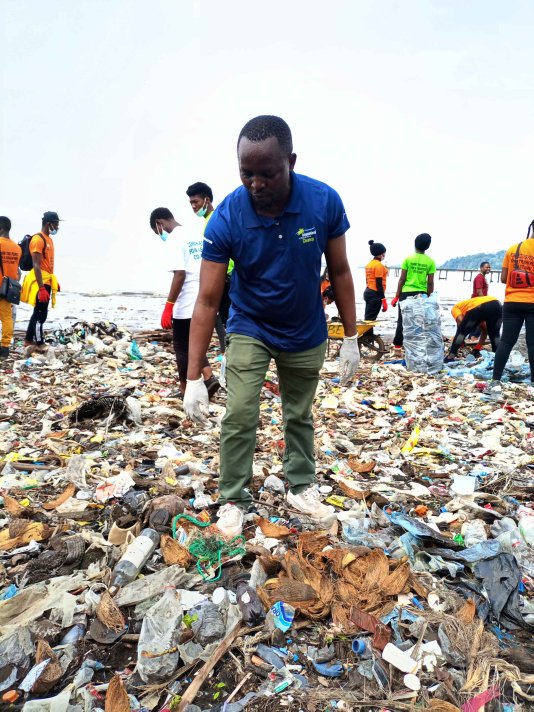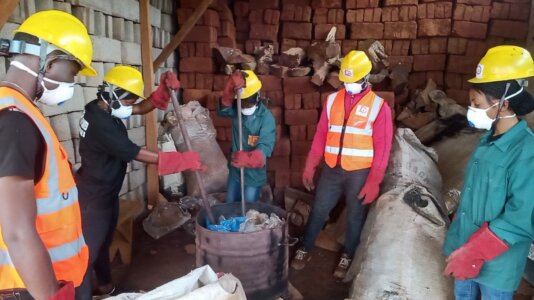- About
- Topics
- Picks
- Audio
- Story
- In-Depth
- Opinion
- News
- Donate
-
Signup for our newsletterOur Editors' Best Picks.Send
Read, Debate: Engage.
| January 31, 2023 | |
|---|---|
| topic: | Conservation |
| tags: | #plastic pollution, #Cameroon, #waste, #volunteer, #ocean |
| located: | Cameroon |
| by: | Njodzeka Danhatu |
Nigerian-born Robinson Sylvanus has been fishing along the coast of Limbe in Cameroon's Southwest Region for the past 20 years. Each time he returns from the sea, he faces the challenge of pulling out his canoe from the seashore. That is because of the various plastics that litter the beach.
Other than the challenge of rolling out his canoe, the large amount of plastic waste covering the beach makes it difficult for Sylvanus to sell his catch, as the place often reeks.
The dirty beach has posed a predicament not only to Sylvanus, but also to hundreds of other fishermen in the coastal town of Limbe.
Formerly a popular tourism spot, Limbe has been steadily loosing its stream of visitors due to the areas growing plastic pollution problem.
Recently, Sylvanus and his peers went fishing in the wee hours of the morning and as they were returning they were both stunned and pleased to discover the beach clean and free from plastic waste, which made it easier for them to pull up their small fishing boats.
The cleaning was carried out by more than 500 young volunteers from over 14 organisations engaged and funded by the Association for Community Awareness (ASCOA), a charitable non-profit organisation with headquarters in Cameroon and offices in the US, UK and Kenya.
The importance of cleaning the coastline, according to ASCOA’s Founder and CEO Linus Ayangwoh Embe, lies in the hazard caused by plastics that often result in diseases threatening the lives of aquatic organisms.
"We care for the environment - mostly the coastline, our ocean - because almost 50 percent of the air we breathe comes from the ocean and we think that it is very important to keep the oceans clean," Embe said.
Their cleanup efforts began after a study they conducted showed that most Cameroonians are not sufficiently informed about the significance of environmental protection, mostly when it comes to waste management. According to Embe, since 2014 the organisation has engaged over 1,470 volunteers and collected 1,451,927 plastic items totalling 927 tons.
"We are working with recycling companies, and after gathering we share these plastics with them for recycling," he told FairPlanet. "We [also] work with other stakeholders: the regional delegation of the environment, to see how we can support the work of the government and the international community."
ASCOA has also been sensitising journalists and community members on ways to manage plastics and prevent them from reaching water channels that funnel them to coastlines. The waste collected is then being sorted out in order to determine which company causes greater pollution.
Furthermore, to ensure that Cameroonian beaches become free from plastics, ASCOA has launched the first edition of "Cameroon Clean Up Day", during which it called on beach lovers, tourists, community mobilisers, stakeholders, private sectors, governmental bodies and other international organisations to come together and salvage beaches from plastic waste and marine debris.
But in the absence of major plastic recycling entities operating in Cameroon, the NGO's is only able to work with individuals and small companies.
"In the Southwest region of Cameroon, we don’t have recycling companies, but we are working towards that so we can see how to resolve this issue when it comes to plastic pollution," Embe said. "We also have other challenges. If we could clean up every month, that would be a good way to keep the coastline clean. [But] we do it once in a while, because we don’t have the resources and we don’t have the manpower to do it all the time."
Despite these challenges, in 2022 ASCOA was able to was able to fund over 14 NGOs working in the field of environmental protection and mobilise thousands of youths to clean the beaches on the Limbe-Idenau coastlines over seven times.
"There is a lot when it comes to plastic pollution, and we are trying our best to see how we can reduce it," Embe added. "We don’t only clean, we also educate the community members on the importance of how to sort their waste out."
Cameroon produces over 600,000 tonnes of plastic annually, only about 20 percent of which gets recycled. In 2014, the government banned the production and importation of non-biodegradable plastics, but the policy's implementation has been tenuous.
According to statistics from the Ministry of Environment, Nature Protection and Sustainable Development, plastic waste represents roughly 10 percent of the six million tonnes of waste produced every day in Cameroonian, and its effects are extremely hazardous as some of it still gets burned.
Recently, over six people died in Buea in Cameroon’s Southwest Region after the burning of plastic on the road by a hygiene and sanitation company released so much smoke that it caused to vehicles to collide.
In Douala, Cameroon’s commercial capital and where the country's major plastic producers are based, gutters stink as plastic waste blocks drainage systems, while in Yaounde, Cameroon’s capital, plastics repeatedly cause floods when it rains and destroy property. According to Greenpeace, hundreds of Cameroonians die or are left displaced every year by flooding caused by blocked drainage channels.
In an attempt to tackle this swelling crisis, ASCOA produced and stationed plastic trashcans where communities can sort out waste which in turn will be recycled.
But ASCOA believes that fully eradicating plastic pollution in Cameroon is a Herculean task, as the country lacks adequate legislative policies on plastic pollution and since the government does not penalise public littering or other environmentally harmful acts.
Also, little is being done to ensure that plastic production companies are held accountable for their actions- a task Embe of ASCOA believes should be taken up by the government. "Their absence in collaborating makes things more difficult," he said.
According to Dr Veronica Ebot Manga, an environmental scientist at the Cameroon’s University of Buea, most plastic producers in Cameroon are not into recycling once it reaches the consumers. In a conversation with FairPlanet, she said that improper plastic waste disposal ends in drainage systems, landfills and the ocean.
During a seminar organised by ASCOA for journalists, Dr Manga, highlighted that Cameroonians can reduce plastic pollution through sustainable consumption, regulations, green businesses, research, citizen participation and clean-up campaigns. According to her, plastics can be recycled into bags, kitchen utensils, containers and brooms, among others.
Meanwhile, ASCOA has been making strides with companies like NAMé Recycling, which is operating three factories in the country and now recycles about 82 percent of its plastic bottles annually.
Other companies like Société Anonyme des boissons du Cameroun, the country’s largest brewing company, are also taking the fight against plastic pollution seriously, while others like Red-Plast are converting plastics to pavement stones and construction tiles.
In Douala, Raymond Westman, formerly a camera technician, is transforming plastic bottles into brooms, saying that this is his way of contributing to environmental protection. Since 2018, Westman has produced over two million brooms from plastic bottles.
Image by ASCOA.



By copying the embed code below, you agree to adhere to our republishing guidelines.
